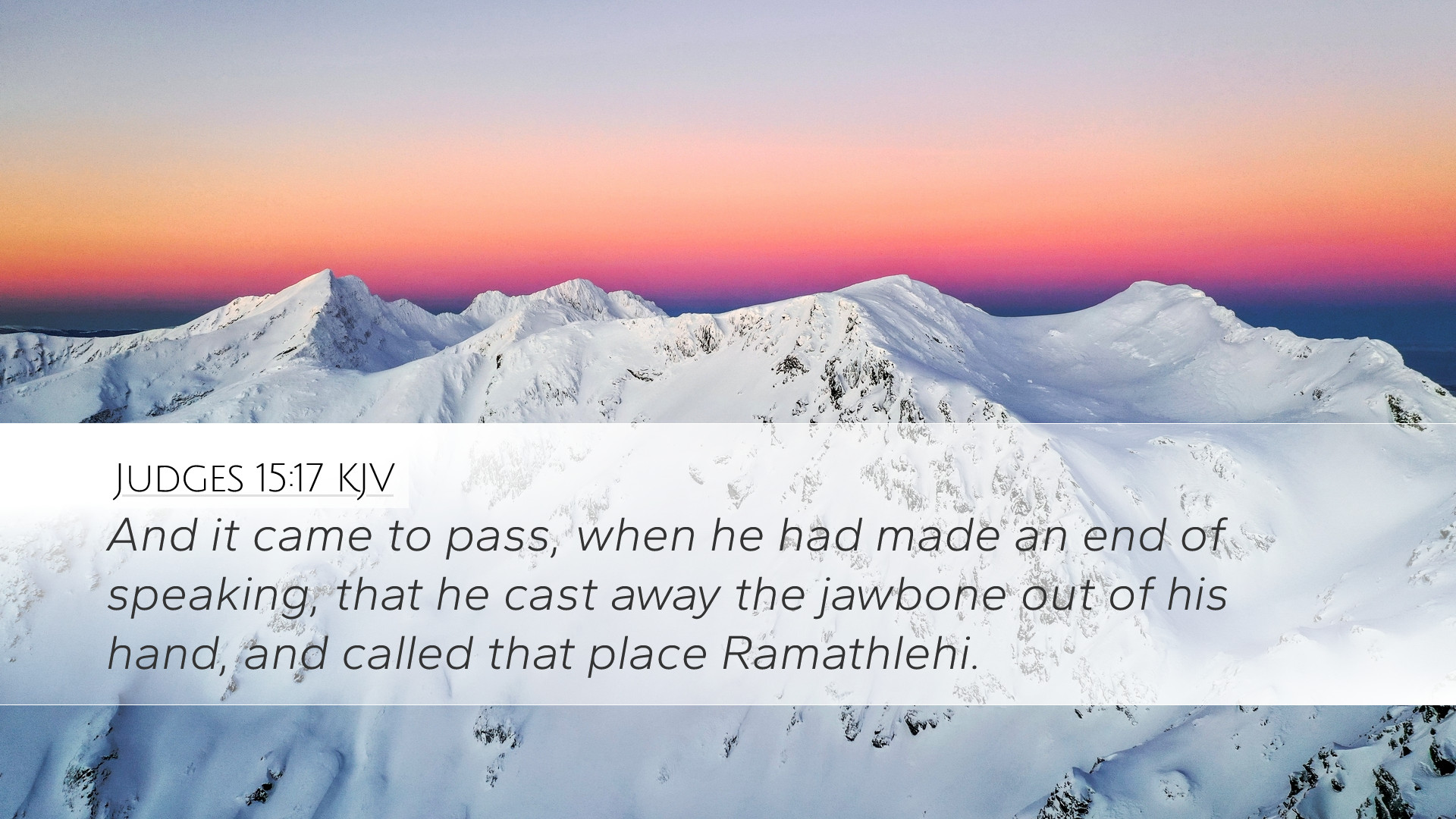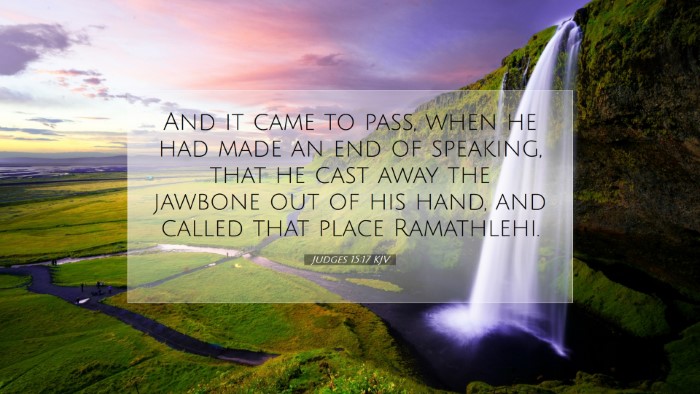Old Testament
Genesis Exodus Leviticus Numbers Deuteronomy Joshua Judges Ruth 1 Samuel 2 Samuel 1 Kings 2 Kings 1 Chronicles 2 Chronicles Ezra Nehemiah Esther Job Psalms Proverbs Ecclesiastes Song of Solomon Isaiah Jeremiah Lamentations Ezekiel Daniel Hosea Joel Amos Obadiah Jonah Micah Nahum Habakkuk Zephaniah Haggai Zechariah MalachiJudges 15:17
Judges 15:17 KJV
And it came to pass, when he had made an end of speaking, that he cast away the jawbone out of his hand, and called that place Ramathlehi.
Judges 15:17 Bible Commentary
Bible Commentary on Judges 15:17
Verse: "And it came to pass, when he had made an end of speaking, that he cast away the jawbone out of his hand, and called that place Ramath-lehi." (Judges 15:17)
Contextual Overview
This verse occurs within the broader narrative of Samson's exploits against the Philistines, chronicling his struggles and divine empowerment. It serves as a pivotal moment, highlighting not only his victory but also the significance of the location named Ramath-lehi, which translates to "the height of the jawbone." Understanding the context requires examining the preceding events and the significance of Samson's actions.
Commentary Insights
-
Matthew Henry's Commentary:
Henry elucidates that this episode showcases both the physical strength and the divine calling of Samson. Trapped by the Philistines, Samson's use of a jawbone as a weapon emphasizes God's provision even in seemingly hopeless circumstances. Henry notes that the act of throwing away the jawbone signifies not only the end of the battle but also a moment of humility, acknowledging that victory belongs to God alone.
-
Albert Barnes' Notes:
Barnes emphasizes the miraculous aspect of Samson's victory, attributing it to the Spirit of the Lord. He explains the significance of the jawbone—the instrument of death being transformed into a means for deliverance. The naming of Ramath-lehi serves as a memorial to God's intervention and power displayed through Samson despite his human frailty. Barnes further connects this event to the overarching theme of Israel's need for a savior and deliverance from oppression.
-
Adam Clarke's Commentary:
Clarke provides a detailed analysis of the significance of the location. He comments on the terrain and geographical implications of Ramath-lehi, suggesting that the place was strategically important for future conflicts. Clarke notes the symbolism in Samson discarding the jawbone, interpreting it as a sign of releasing past struggles. He encourages readers to reflect on their own battles and the divine assistance one can expect when reliant on God.
Theological Implications
Judges 15:17 raises important themes for theological discourse:
-
The Nature of Divine Strength:
The victory achieved by Samson showcases that true strength is derived not from human might but from divine enablement. This principle is pivotal for spiritual leaders, reinforcing the notion that reliance on God is essential for achieving His purposes.
-
The Role of Memory in Faith:
By naming the place Ramath-lehi, Samson creates a memorial of God's provision. The importance of memorials in faith practice is critical, as they are instrumental in remembering God's deliverance, which encourages faith for future challenges.
-
The Symbol of the Jawbone:
The jawbone serves as an unusual yet potent symbol of God's ability to use what is often considered weak or insignificant for His glory. This mirrors New Testament themes where God uses the foolish things of the world to confound the wise.
Applications for Today
This passage provides valuable lessons applicable to contemporary believers:
-
Reliance on God:
Whether facing personal, spiritual, or communal battles, believers are reminded to place their trust in God, who empowers and equips them for victory against trials.
-
Faithfulness in Adversity:
Samson's story illustrates that God can work through our weaknesses and failures. Faithfulness in adversity prepares us for God's greater purposes.
-
Remembering God’s Deliverance:
Practicing remembrance through prayer, worship, and testimony can fortify a congregation's faith as they recount God's faithfulness in their lives.
Conclusion
Judges 15:17 encapsulates a critical moment in the life of Samson, reflecting the dynamics of faith, strength, and God's sovereign action in the life of His people. Insights from public domain commentaries provide a rich understanding for pastors, students, theologians, and scholars, encouraging deep reflection on the nature of divine empowerment and the importance of remembering God's victories.


